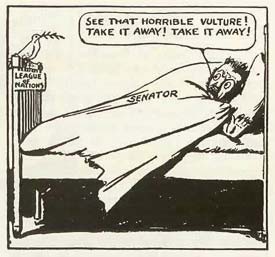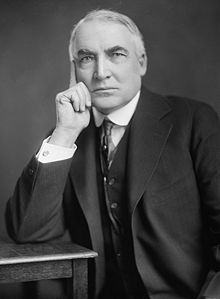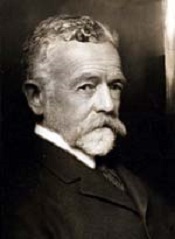 Political cartoon mocks Senate resistance to ratifying Treaty of Versailles. ("Seein' Things," Brooklyn Eagle, 1919, authentichistory.com)
Political cartoon mocks Senate resistance to ratifying Treaty of Versailles. ("Seein' Things," Brooklyn Eagle, 1919, authentichistory.com)
Entangling Alliances
The end of World War I and the resulting Treaty of Versailles profoundly affected the geopolitics of Europe and the rest of the world. President Woodrow Wilson, claiming that "idealism is going to save the world," tried vainly to gain support for the League of Nations to keep the peace internationally.
During the war, Wilson and others tried to find a
way to bring about peace based on four principles: the substitution of an international organization for the old alliance system; the substitution of arbitration for armaments; the institution of self government; and the avoidance of seizures of territories and of reparation demands. In 1916 he advocated the idea of a "league of nations" and the next year he called for a "peace without victory." In fact, Wilson spurned the idea of entangling alliances when the United States entered the war not as one of the "Allies" but rather as an "associated" belligerent.
The Fourteen Points
 President Woodrow Wilson sought to engage America in ensuring world peace. (whitehouse.gov)
President Woodrow Wilson sought to engage America in ensuring world peace. (whitehouse.gov)
By January 1918, Wilson announced his Fourteen Points, with the hope of bringing a lasting peace. The
points reflected his belief in the interconnections between free trade, democratic institutions
and human liberty. While the Allied leaders disliked the Fourteen Points, sufficient pressure was applied to make them the basis of the Armistice.
But Wilson later confronted powerful geopolitical forces in Europe that forced numerous concessions in the Fourteen Points. Compromises were made related to rights of self-determination and harsh reparations were imposed on Germany.
Still, the Treaty of Versailles, signed in June 1919, may have been the best deal he could make considering the politics and attitudes of those involved.
Wilson hoped a key provision of his Fourteen Points and the Treaty of Versailles would provide a mechanism to rectify some of the treaty's shortcomings. The treaty included the covenant of the League of Nations. In the aftermath
of the greatest carnage ever seen, the league sought to promote international cooperation
to achieve international peace and security. Among other provisions, members agreed to seek arbitration through the League before going to war.
Seeking Senate Ratification
The president turned his attention to gaining the necessary ratification of the treaty by the U.S. Senate to allow American participation. Popular opinion in the nation was favorable.
But the Senate was full of crosscurrents of opinion and 2/3 of the body was needed for ratification. Many senators believed rather than
get involved in international affairs, the U.S. should create a model society for other nations to emulate. Other senators wanted to make adoption of the treaty based on various reservations, many related to the League of Nations. (
 Listen to speech by U.S. Secretary of War Newton Baker
Listen to speech by U.S. Secretary of War Newton Baker
"On the League of Nations," dated 1919 - mp3 via firstworldwar.com)
 President Warren G. Harding campaigned for a return to "normalcy."
President Warren G. Harding campaigned for a return to "normalcy."
 Senator Henry Cabot Lodge fought treaty ratification. (Library of Congress)
Senator Henry Cabot Lodge fought treaty ratification. (Library of Congress)
In the end, the Senate failed to ratify the treaty. Politics, personal animus, and Wilson's refusal to compromise doomed the effort. Throughout the negotiations, Wilson had to contend with Senate Majority Leader Henry Cabot Lodge. The two men hated each other and Lodge was well positioned to cause problems for the president. Lodge was not an isolationist, but he believed the League of Nations threatened national sovereignty. He and others demanded changes that Wilson refused to make on moral and other grounds.
As
negotiations dragged on, the public lost interest
and shifted focus to the rising problems
of inflation, unemployment
and fear of radicalism. With the election of Warren G. Harding in 1920, America turned inward as it embraced his
call for a return to "normalcy."
(
 Listen to speech by Warren G. Harding
Listen to speech by Warren G. Harding dated 1919 - mp3 via firstworldwar.com)
The League of Nations limped on without the participation of the United States. America moved into the "Roaring Twenties" effectively on its own.